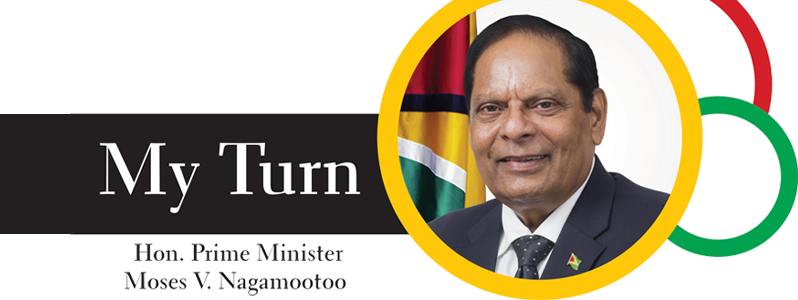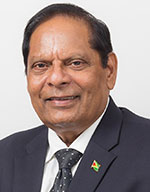TODAY is International Human Rights Day, observance of which goes back to 1948 when the United Nations adopted the Universal Declaration of Human Rights.
In a statement on the occasion, the UN again hailed the Declaration for proclaiming the inalienable rights to which all are entitled – regardless of race, colour, religion, sex, language, political or other opinion, national or social origin, property, birth or other status.
It added that the Declaration established the equal dignity and worth of every person and laid the foundation for a more just world based on equality, justice and human dignity.
This Declaration has also motivated freedom fighters everywhere and its main principles of equality and justice were inscribed on the banner of all anti-colonial revolutionaries.
FUNDAMENTAL RIGHTS
It further formed the basis for the constitutions of newly free countries such as Guyana, which have all enshrined elaborate sections on fundamental rights and freedoms of the individual. In the case of Guyana, our constitution amplified these rights and placed them within the context of a defined political, economic and social system.
These are the declarations and principles against which countries are judged when their report cards are examined for violations. Very few countries ever live up fully to the expectations much less, the letter of those entrenched rights. Most countries, even the most developed, would be cited annually for violation of one or more aspects of human rights
This is a good opportunity for our people, especially students, to pick up the constitution of the Co-operative Republic of Guyana and read the lofty goals that this nation has set itself. It is also timely to do so when both promises and calls have been made for a comprehensive review of the constitution and for consultations to begin on reforming it. It should be noted that for this process to take place, a further financial allocation has been made in the 2018 Budget.
TWO-THIRDS MAJORITY
I fear though, that this process may not kick off any time soon, since constitutional reform would require a buy-in from all the parliamentary political parties. In the least, fundamental changes would require a two-thirds majority of the votes in the National Assembly. No one party would be able to effect any major changes.
As of now, the opposition party has taken an ambivalent position that while it recognised the need for constitutional reform, it would insist instead on what it described as “constitutional compliance” by the government of key provisions of the existing constitution. Translated into practical terms, the PPP is saying, “Yes, but not yet.”
On the other hand, the government believes in the need for review of the powers of the Executive and for provisions to be included that would allow greater inclusion in the governance process. Some members of the government have gone so far as to articulate the need for a power-sharing constitutional formula based on the winner-does-not-take-all principle. They believe that Guyana should evolve an authochthonous or local model of governance on the basis of its plural, multi-ethnic, multi-cultural population.
NATIONAL UNITY
That model, styled a Government of National Unity, had been mooted in the 70s, and advocated by constitutional experts such as Professor Harold Lucthman in the 80s. It has since been described invariably as a Rodneyite principle, and was articulated by the Working People’s Alliance (WPA) in the mid-70s as a formula for a government of national reconstruction and, two years later, by the Jagan-led PPP in its proposal for a National Front Government.
In spite of very good intentions, Guyana was to endure some 50 unbroken years of one-party rule, interchangeably by the two dominant political parties – the PNC and the PPP. However, the back of one-party rule was broken only once since then, with the entry to office after the May 2015 elections of a multi-party coalition government.
Now, mid-way into its first term in office, the issue of a government of national unity is once again surfacing under the guise of constitutional reform. One of the foremost proponents is Lincoln Lewis who, to his credit, has insisted on full respect for Article 13 of our Constitution, and for inclusion to reflect the the aspirations of the working people.
DEVOLUTION OF AUTHORITY
An aspect of fundamental human rights of the Guyanese people is local governance, which is the devolution of political authority to the grassroots. The government could rightly feel satisfied that just after a year of taking office, it held local government elections which were denied by the previous administration for some two decades.
The government would also claim that it has even partially fulfilled the requirement of inclusive governance through its six-party coalition, and it continues to promote both bi-partisanism at the parliamentary level and partnership with labour and business at the social level.
Heading the list of fundamental human rights is the entitlement to a happy life. The four budgets of the coalition reflect that goal, and are committed to pursuit of the good life for all. It provokes annoyance from the opposition for whom the good life should be delusional and unattainable.
IMPRESSIVE SCORE SHEET
The government has an impressive human rights score sheet. There are no political prisoners in Guyana; no extra-judicial killings; no torturing of prisoners, no incestuous relations with drug cartels – all of which have tainted Guyana’s image abroad under the previous PPP government.
There have been allegations after the July prison fire and the re-location of an estimated 1,200 prisoners that the holding areas did not meet approved standards. No one could deny that the open-air holding area at Lusignan, literally a pasture, was not suitable, but it was what was available in the circumstances. Immediately efforts got underway to reconstruct some of the facilities at Camp Street and at other locations including Mazaruni.
What would continue to raise the eye-brows of human rights activists is why and how the central prison that was built to house 600 inmates became over-crowded with over 1,200? And why would prisoners be languishing on remand for as many as 10 years? This remains a serious indictment of the PPP administration, which had been in office for over two decades.
MEDIA FREEDOM
An important human right is to impart and receive information. In this regard, Guyana enjoys freedom of the press as never before. There is no political interference with the media; no denial of state advertisements to non-government newspapers. The media remain plural, but a fresh controversy has been raised over the grant of radio licences to political operatives by the Jagdeo administration, even whilst the licensees held ministerial portfolios. One of the directors was a presidential adviser and another the General Secretary of the ruling party. That justifiably raises issues of sleaze and nepotism.
The separation of powers is fully observed in Guyana. There is respect for the rule of law and the principle of non-interference. It is this coalition government that made the judiciary a constitutional agency and guaranteed its financial independence along with the Parliament Office, the Elections Commission, etc. The former administration resisted all attempts to give the constitutional agencies a lump sum allocation, and had made them vulnerable to political blackmail and diktat.
FULL PARLIAMENTARY DEMOCRACY
Finally, there is full, open, multi-party, parliamentary democracy in Guyana. The opposition’s claims of being muzzled is false and baseless. Under the PPP, the 10th Parliament held 88 sittings. But this 11th Parliament has already held 79 sittings, even though this is only the mid-term of the Coalition Government.
It is with a sense of pride and satisfaction that I salute Human Rights Day, and encourage all human rights activists to stand up, speak out, and continue to be vigilant.




.png)









